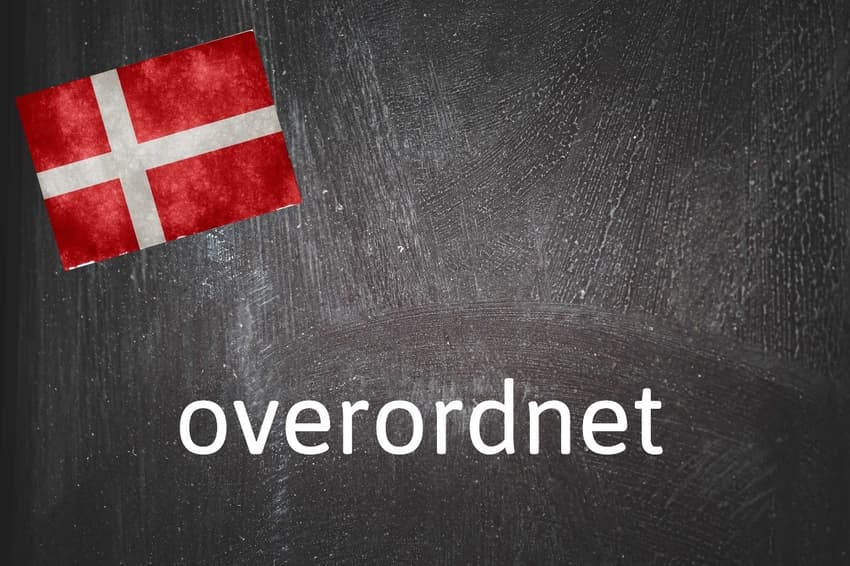Danish word of the day: Overordnet

Photo by Francesco Ungaro on Unsplash and Nicolas Raymond/FlickR
We'll try to give you an overarching explanation of today's word of the day.
What is overordnet?
While we covered the meaning of over previously (spoiler: it means "over"), you'll also need the translation of the verb at ordne to get a sense of how to use overordnet.
Because it has its roots in Latin, at ordne (from the Latin "ordinare") is easy enough to understand for an English speaker. When used in Danish, it signifies to sort, place in a correct order, tidy or fix something. It can also mean to take care of a problem, conflict or situation: Lejligheden sejlede da jeg kom hjem, så jeg ordnede den lige hurtigt ("the apartment was a mess when I came home, so I gave it a quick sort-out").
Getting back to overordnet, which is an adjective in the form of a past-tense verb, the prefix suggests something ahead in a certain order. In other words, overordnet can be someone of a higher rank, such as in the military or at a work place.
It can also mean a higher meaning or context, similar to how you might use "overall" in English -- an overordnet strategi, for example, can be a company's long-term business model, around which it builds its more immediate aims.
Why do I need to know overordnet?
While it's a good example of an adjective that is formed from a rarely-used verb (at overordne), it's also a word that will help you to convey nuance and give sentences in spoken Danish a sense of articulacy (provided you don't overuse it, then you might end up sounding like a proponent of 'management speak').
You can some up your thoughts on a certain subject by saying overordnet set (approximately, "generally speaking") or say that you have been thinking up an overordnet plan ("overall plan").
Like all good "over" words, overordnet has and "under"-based antonym. Underordnet is an even more expressive word than its superior (in a literal sense) opposite, and is usually used to dismiss something as irrelevant: det er underordnet, om det tager fem minutter eller en time, bare jeg får tid til en gåtur hver dag ("it doesn't matter whether it takes five minutes or an hour, as long as I get a chance to take a walk every day").
Examples
Jeg forstår ikke, den overordnede betydning med universet.
I don't understand the overall meaning of the universe.
Jeg kan desværre ikke svare på dit spørgsmål, inden jeg har talt med min overordnede.
I'm afraid I can't answer your question until I've spoken with my superior.
Comments
See Also
What is overordnet?
While we covered the meaning of over previously (spoiler: it means "over"), you'll also need the translation of the verb at ordne to get a sense of how to use overordnet.
Because it has its roots in Latin, at ordne (from the Latin "ordinare") is easy enough to understand for an English speaker. When used in Danish, it signifies to sort, place in a correct order, tidy or fix something. It can also mean to take care of a problem, conflict or situation: Lejligheden sejlede da jeg kom hjem, så jeg ordnede den lige hurtigt ("the apartment was a mess when I came home, so I gave it a quick sort-out").
Getting back to overordnet, which is an adjective in the form of a past-tense verb, the prefix suggests something ahead in a certain order. In other words, overordnet can be someone of a higher rank, such as in the military or at a work place.
It can also mean a higher meaning or context, similar to how you might use "overall" in English -- an overordnet strategi, for example, can be a company's long-term business model, around which it builds its more immediate aims.
Why do I need to know overordnet?
While it's a good example of an adjective that is formed from a rarely-used verb (at overordne), it's also a word that will help you to convey nuance and give sentences in spoken Danish a sense of articulacy (provided you don't overuse it, then you might end up sounding like a proponent of 'management speak').
You can some up your thoughts on a certain subject by saying overordnet set (approximately, "generally speaking") or say that you have been thinking up an overordnet plan ("overall plan").
Like all good "over" words, overordnet has and "under"-based antonym. Underordnet is an even more expressive word than its superior (in a literal sense) opposite, and is usually used to dismiss something as irrelevant: det er underordnet, om det tager fem minutter eller en time, bare jeg får tid til en gåtur hver dag ("it doesn't matter whether it takes five minutes or an hour, as long as I get a chance to take a walk every day").
Examples
Jeg forstår ikke, den overordnede betydning med universet.
I don't understand the overall meaning of the universe.
Jeg kan desværre ikke svare på dit spørgsmål, inden jeg har talt med min overordnede.
I'm afraid I can't answer your question until I've spoken with my superior.
Join the conversation in our comments section below. Share your own views and experience and if you have a question or suggestion for our journalists then email us at [email protected].
Please keep comments civil, constructive and on topic – and make sure to read our terms of use before getting involved.
Please log in here to leave a comment.